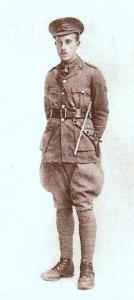
|

|
| Lieutenant Brian Edmund Douglas WARDE | |
|
6th (Reserve) Battalion Royal Fusiliers (City of London Regiment) attached to the 4th Battalion Date of birth: 29th July 1894 Date of death: 16th June 1915 Killed in action aged 20 Commemorated on the Menin Gate Panels 6 and 8 |

|
| Brian Edmund Douglas Warde was born at "Treaty House", Hounslow in Middlesex on the 29th of July 1894 the second son of Major Charles Aprilis Enthon Warde, Royal Fusiliers, and Felicia (nee Douglas) Warde of 2 Buckingham Mansions, Kensington in London. He was christened at the Holy Trinity Church, Hounslow on the 1st of September 1894. He was educated at Colet Court School in Kensington, at Bilton Grange School in Rugby and at Lancing College from September 1908 where he won an Exhibition and was in Olds House, moving with Mr. Ferguson to News House from September 1910, and was in Fields House from September 1912 until leaving in the December. He was appointed as a House Captain in May 1912 and, in his last term, he was the first Head of Fields House. He was also appointed as a Prefect in September 1912. He was a prominent member of the Shakespeare Society and won the Prize Essay for French "on more than one occasion". He served as a member of the Officer Training Corps for four years and one month where he rose to the rank of Lance Corporal. He was an excellent game shot and was devoted to field sports. He worked as an apprentice to the produce brokers Sanderson & Co, Colonial Brokers and was intending to go to Ceylon to work as a planter but instead he joined the army when war was declared. He applied for a commission in the 6th (Reserve) Battalion Royal Fusiliers (City of London Regiment) on the 5th of August 1914. He underwent a medical examination at the War Office on the 13th of August where it was recorded that he was six feet tall and weighed 154lbs. He was commissioned as a 2nd Lieutenant in the battalion on the 15th of August 1914. After training at Dover, where he was stationed at Dover Castle, he embarked for service in France with a draft of reinforcements for the 4th Battalion of his regiment, on the 28th of December 1914 and landed there the following day. He was promoted to Lieutenant on the 2nd of February 1915. He served with the battalion at St Eloi, at Ypres and elsewhere in Flanders. At 1.30am on the 16th of June 1915 the 4th Battalion Royal Fusiliers was in position to the east of Cambridge Road Trench in preparation for an attack on Bellewarde Farm Ridge. Their objective was a wood to their immediate front which had a trench guarding it. At 2.50am the artillery bombardment began and at 4.50am two companies went forward on the left and captured the German front line without significant resistance. On the right the two remaining companies pushed through the wood to the trench on the west side of Bellewarde Lake but advanced too quickly and suffered casualties from their own artillery. Despite their gains the battalion was forced back by the sheer weight of fire from the German artillery as well as gas and some short fire from their own artillery which forced them to withdraw to a captured communication trench. They held this position against a number of counterattacks until ordered to retire later in the afternoon. On that day Brian Warde was the only officer from his company who remained unhurt in the initial attack. He had helped in the capture of three lines of German trenches and had fallen back to the German second line where his wounded Captain saw him quite unconcerned and leading a group of men down the trench for its defence. He jumped on to the parapet to fire on, and bomb a party of the advancing enemy, when he was hit in the head by a sniper. He died an hour later having not regained consciousness and was buried in the trench where he fell. Of the 22 officers and 820 men who went into the attack 15 officers and 376 men were killed wounded or missing at the end of the day. His father received the following telegram dated the 18th of June 1915: - "Deeply regret to inform you that Lt. B.E.D. Warde Royal Fusiliers is reported killed in action. Lord Kitchener expresses his sympathy." He received a further telegram dated the 27th of June 1915: - "The date on which the late B.E.D. Warde was killed is now reported as 16th June." His Commanding Officer wrote of him:- “He will be a great loss to us, he was always cheerful, was a very brave officer and a real good leader of men….He was sniped from the flank and killed dead.” A brass tablet in his memory was placed in the south aisle of Lancing College Chapel in the Advent term of 1916. His cousin applied for his medals on behalf of his mother in May 1920. |
|
| Fields House |
Back